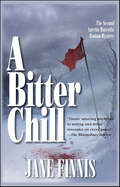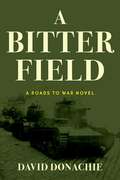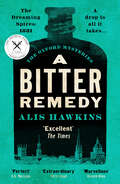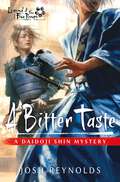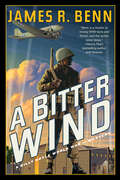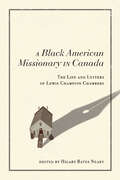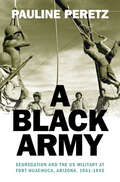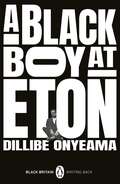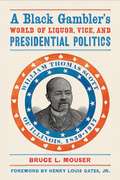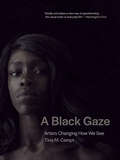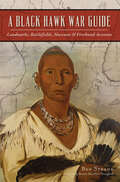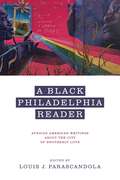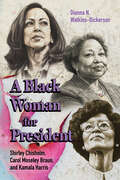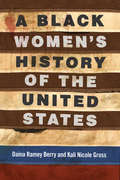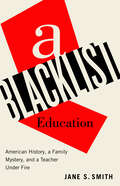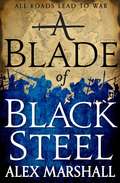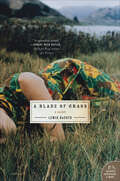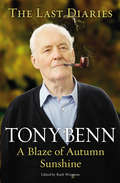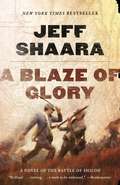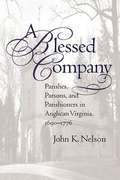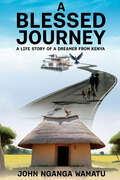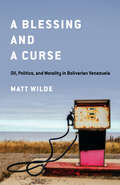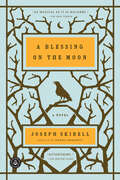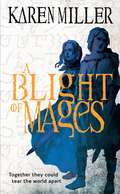- Table View
- List View
A Bitter Chill: An Aurelia Marcella Roman Mystery (Aurelia Marcella Roman Series #2)
by Jane FinnisIn late December 95 AD, Roman settlers in Britannia are preparing to celebrate Saturnalia. Innkeeper Aurelia Marcella's plans for a peaceful holiday are shattered when her brother brings bad news. An enemy in Rome is trying to destroy her family by spreading rumors that they are plotting against Caesar. Her brother has lost his job as a government investigator, the mansio is menaced by a gang of native criminals, and when a party of rich, demanding travelers arrive to stay, their quarrels and violence spill over into Aurelia's household. Then the Saturnalia banquet, highlight of the festival, culminates in tragic death. The second installment in the Aurelia Marcella series.
A Bitter Field: A Roads to War Novel (Roads to War)
by David DonachieThe final installment in Donachie's sweeping Roads to War series set in the pre-WWII European powder keg1938: As Hitler sets his sights on the Sudetenland, not everyone in Britain is willing to appease him. Convinced that the Führer's land hunger is insatiable, the head of the SIS recruits Cal Jardine to help him prove that Czechoslovakia is threatened with invasion. But before heading undercover to Prague, Jardine must first extricate himself from France, where his attempts to smuggle guns to Spain have been held up by a group of fanatical fascists. In their struggle to overthrow the French government, they are prepared to kill for the sake of procuring weapons.When Cal finally arrives in Czechoslovakia, working undercover for the SIS proves no less dangerous as jealousy and mutual suspicions within Secret Service ranks make it impossible for him to tell friend from foe.
A Bitter Remedy: A totally compelling historical mystery (Oxford Mysteries)
by Alis HawkinsAmongst the scholars, secrets and soporifics of Victorian Oxford, the truth can be a bitter pill to swallow… Jesus College, Oxford, 1881. An undergraduate is found dead at his lodgings and the medical examination reveals some shocking findings. When the young man’s guardian blames the college for his death and threatens a scandal, Basil Rice, a Jesus College fellow with a secret to hide, is forced to act and finds himself drawn into Sidney Parker’s sad life. The mystery soon attracts the attention of Rhiannon ‘Non’ Vaughan, a young Welsh polymath and one of the young women newly admitted to university lectures. But when neither the college principal nor the powerful ladies behind Oxford’s new female halls will allow her to become involved, Non’s fierce intelligence and determination to prove herself drive her on. Both misfits at the university, Non and Basil form an unlikely partnership, and it soon falls to them to investigate the mysterious circumstances of Parker’s death. But between corporate malfeasance and snake-oil salesmen, they soon find the dreaming spires of Oxford are not quite what they seem… An intriguing first installment of The Oxford Mysteries series by master crime writer, Alis Hawkins. Perfect for fans of Laura Shepherd-Robinson, S.G. MacLean and Kaite Welsh. Praise for A Bitter Remedy ‘An excellent historical mystery dripping with atmosphere that exposes the chauvinism, misogyny and bigotry of late Victorian England’ The Times ‘Her inventiveness is prodigal’ Financial Times ‘Fearlessly tackles taboo attitudes of the era, taking aim at misogyny, homophobia, and sexual politics. An excellent addition to the historical mystery canon. Marvellous!’ Vaseem Khan, author of Midnight at Malabar House ‘A Bitter Remedy is a perfect tonic for our times.’ S. G. MacLean author of The Seeker ‘Absolutely brilliant! Thoughtful, complex and engrossing’ Chris Lloyd, author of The Unwanted Dead ‘A superb atmospheric mystery to the last page’ Rachel Lynch, author of Dark Game ‘I can’t wait for Non and Basil’s next case!’ Katherine Stansfield author of Falling Creatures
A Bitter Taste: Legend of the Five Rings: A Daidoji Shin Mystery (Legend of the Five Rings)
by Josh ReynoldsGentleman sleuth Daidoji Shin faces his trickiest case yet when he finds himself being framed for murder in this captivating cozy fantasy mystery from Legend of the Five Rings.In the fantasy empire of Rokugan, when a Crane Clan auditor turns up dead in a soy brewery, all eyes turn to nobleman-turned-detective, Daidoji Shin… but not to solve the man&’s murder; rather, Shin is the suspect. Now Shin must attempt to figure out who killed the victim and, more importantly, who framed him, all while outwitting the authorities on his trail – including a dogged Kitsuki investigator with a score to settle. Caught in a spider&’s web of intrigue and with his enemies closing in, time is running out for Dadoiji Shin…
A Bitter Wind (A Billy Boyle WWII Mystery)
by James R. BennTo solve a murder at an English airbase, US Army Captain Billy Boyle must immerse himself in the fascinating and secretive world of WWII radio espionage.Christmas Day 1944: After his last mission put him in the tailspin of the Battle of the Bulge, Captain Billy Boyle travels to southeast England to visit his girlfriend, Diana Seaton, for a brief holiday respite. Diana is engaged in classified work at RAF Hawkinge, including Operation Corona, which recruits German-speaking Women&’s Auxiliary Air Force members—many of them Jewish refugees from the Kindertransport rescue—to countermand German orders and direct night fighters away from Allied bombers.It&’s fascinating and critical espionage work, but it&’s laced with peril, as Billy finds out. On a scenic Christmas walk along the White Cliffs of Dover, Billy and Diana stumble upon the dead body of a US Air Force officer. In the dead man&’s pocket are papers with highly confidential information about radio interception operations. Information worth killing over.As Billy digs into the secret world of codebreakers and radio jammers stationed at Hawkinge, another body turns up. Now Billy must find out what connects these two men—and who was so hell-bent on silencing them. Enlisting the help of his long-time associates, Billy undertakes another thrilling investigation that brings him to war-torn Yugoslavia, where he must rescue an escaped POW who may be the only person who knows the truth.
A Black American Missionary in Canada: The Life and Letters of Lewis Champion Chambers (McGill-Queen's Studies in the History of Religion)
by Hilary Bates NearyLewis Champion Chambers is one of the forgotten figures of Canadian Black history and the history of religion in Canada. Born enslaved in Maryland, Chambers purchased his freedom as a young man before moving to Canada West in 1854; there he farmed and in time served as a pastor and missionary until 1868. Between 1858 and 1867 he wrote nearly one hundred letters to the secretary of the American Missionary Association in New York, describing the progress of his work and the challenges faced by his community. Now preserved in the collections of the Amistad Research Center at Tulane University, Chambers’s letters provide a rare perspective on the everyday lives of Black settlers during a formative period in Canadian history. Hilary Neary presents Chambers’s letters, weaving into a compelling narrative his vivid accounts of ministering in forest camps and small urban churches, establishing Sabbath schools and temperance societies, combating prejudice, and offering spiritual encouragement. Chambers’s life as an American in Canada intersected with significant events in nineteenth-century Black history: manumission, the Fugitive Slave Act, the Underground Railroad, the Civil War, Emancipation, and Reconstruction. Throughout, Chambers’s fervent Christian faith highlights and reflects the pivotal role of the Black church – African Methodist Episcopal (United States) and British Methodist Episcopal (Canada) – in the lives of the once enslaved. As North Americans explore afresh their history of race and racism, A Black American Missionary in Canada elevates an important voice from the nineteenth-century Black community to deepen knowledge of Canadian history.
A Black Army: Segregation and the US Military at Fort Huachuca, Arizona, 1941–1945 (Military, War, and Society in Modern American History)
by Pauline PeretzFrom 1941 to 1945, 30,000 African-American infantrymen were stationed at Fort Huachuca near the Mexican border. It was the only 'black post' in the country. Separated from white troops and civilian communities, these infantrymen were forced to accept the rules and discipline that the US Army, convinced of their racial inferiority, wanted to impose on them. Mistrustful of black soldiers, the Army feared mutiny and organized a harsh segregation that included strict confinement, control of the infantrymen during training and leisure, and the physical separation of white and black officers to diffuse any suggestion that equality of rank translated into social equality. In this book, available for the first time in English, Pauline Peretz uncovers America's tortuous relationship with its black soldiers against the backdrop of a war fought in the name of democracy.
A Black Boy at Eton (Black Britain: Writing Back #11)
by Dillibe Onyeama'The story [Onyeama] had to tell was so gripping and shocking, it wouldn't let me go . . . A remarkably well-written memoir' Bernardine Evaristo, from the IntroductionDillibe was the second black boy to study at Eton - joining in 1965 - and the first to complete his education there. Written at just 21, this is a deeply personal, revelatory account of the racism he endured during his time as a student at the prestigious institution. He tells in vivid detail of his own background as the son of a Nigerian judge at the International Court of Justice at The Hague, of his arrival at the school, of the curriculum, of his reception by other boys (and masters), and of his punishments. He tells, too, of the cruel racial prejudice and his reactions to it, and of the alienation and stereotyping he faced at such a young age. A Black Boy at Eton is a searing, ground-breaking book displaying the deep psychological effects of colonialism and racism.A title in the Black Britain: Writing Back series - selected by Booker Prize-winning author Bernardine Evaristo, this series rediscovers and celebrates pioneering books depicting black Britain that remap the nation.
A Black Gambler's World of Liquor, Vice, and Presidential Politics
by Bruce L. MouserWilliam Thomas Scott (1839-1917) was an entrepreneur and political activist from East Saint Louis and Cairo, Illinois, who in 1904 briefly became the first African American nominated by a national party for president of the United States before his scandalous past forced him to step aside. A free man before the Civil War, Scott was a charismatic hustler who built his fortune through both vice trades and legal businesses including hotels, saloons, and real estate. Publisher and editor of the "Cairo Gazette" and an outspoken advocate for equal rights, he believed in political patronage and frequently rebelled against political bosses who failed to deliver, whether they were white, black, Republican, or Democrat. Scott helped build the National Negro Liberty Party to forward economic, political, and legal rights for his race. But the hustling that had brought him business success proved his undoing as a national political figure. He was the NNLP's initial presidential nominee, only to be replaced by a better-educated and more socially acceptable candidate, George Edwin Taylor. "
A Black Gaze: Artists Changing How We See
by Tina M. CamptExamining the work of contemporary Black artists who are dismantling the white gaze and demanding that we see--and see Blackness in particular--anew.In A Black Gaze, Tina Campt examines Black contemporary artists who are shifting the very nature of our interactions with the visual through their creation and curation of a distinctively Black gaze. Their work--from Deana Lawson's disarmingly intimate portraits to Arthur Jafa's videos of the everyday beauty and grit of the Black experience, from Khalil Joseph's films and Dawoud Bey's photographs to the embodied and multimedia artistic practice of Okwui Okpakwasili, Simone Leigh, and Luke Willis Thompson--requires viewers to do more than simply look; it solicits visceral responses to the visualization of Black precarity. Campt shows that this new way of seeing shifts viewers from the passive optics of looking at to the active struggle of looking with, through, and alongside the suffering--and joy--of Black life in the present. The artists whose work Campt explores challenge the fundamental disparity that defines the dominant viewing practice: the notion that Blackness is the elsewhere (or nowhere) of whiteness. These artists create images that flow, that resuscitate and revalue the historical and contemporary archive of Black life in radical ways. Writing with rigor and passion, Campt describes the creativity, ingenuity, cunning, and courage that is the modus operandi of a Black gaze.
A Black Hawk War Guide: Landmarks, Battlefields, Museums & Firsthand Accounts (Military)
by Ben StrandThe Black Hawk War was the final conflict east of the Mississippi River between American Indian communities and the United States regular troops and militia. Exploring the museums, wayside markers and parks relating to that struggle is not just a journey of historic significance through beautiful natural scenery. It is also an amazing convergence of legendary personalities, from Abraham Lincoln to Jefferson Davis. Follow the fallout of the war from the Quad Cities on the Illinois/Iowa border, through the "Trembling Lands" along the Kettle Morraine and into the Driftless Area of southern Wisconsin. Pairing local insight with big-picture perspective, Ben Strand charts an overlooked quadrant of America's frontier heritage.
A Black History Reader: 101 Questions You Never Thought To Ask
by Claud Anderson"A Black History Reader, Dr. Claud Anderson’s fifth book, was written to highlight and examine the ignored Social Construct on Race, its effects on Black Americans and strategies they can use to take advantage of its weakness. Using a Q&A format, Dr. Anderson focuses on the etiology of White racism imbedded within the Social Construct."--Publisher's website.
A Black Philadelphia Reader: African American Writings About the City of Brotherly Love
by Louis J. ParascandolaThe relationship between the City of Brotherly Love and its Black residents has been complicated from the city’s founding through the present day. A Black Philadelphia Reader traces this complex history in the words of Black writers who were native to, lived in, or had significant connections to the city. Featuring the works of famous authors—including W. E. B. Du Bois, Harriet Jacobs, Sonia Sanchez and John Edgar Wideman—alongside lesser-known voices, this reader is an immersive and enriching composite portrait of the Black experience in Philadelphia. Through fiction and nonfiction, poetry and prose, readers witness episodes of racial prejudice and gender inequality in areas like public health, housing, education, policing, criminal justice, and public transportation. And yet amid these myriad challenges, the writers convey an enduring faith, a love of family and community, and a hope that Philadelphia will fulfill its promises to its Black citizens.Thoughtfully introduced and accompanied by notes that contextualize the works and aid readers’ comprehension, this book will appeal to a wide audience of Philadelphians and other readers interested in American, African American, and urban studies.
A Black Woman for President: Shirley Chisholm, Carol Moseley Braun, and Kamala Harris
by Dianna N. Watkins-DickersonThroughout US history, only three Black women—Shirley Chisholm, Carol Moseley Braun, and Kamala Harris—have given successfully recognized bids for the office of president of the United States. In A Black Woman for President, author Dianna N. Watkins-Dickerson uses womanist rhetorical criticism to analyze the presidential announcement speeches of Congresswoman Shirley Chisholm, Ambassador Carol Moseley Braun, and then-Senator Kamala Harris. In close readings of each candidate’s speeches, Watkins-Dickerson defines womanist rhetorical theory and its efficacy for researching Black female voices in the field of communication in general, and the presidential announcement speeches of Black women, specifically. Beginning with Shirley Chisholm’s historic 1972 campaign as the first Black woman to run a viable campaign for the US presidency, the volume analyzes how Chisholm’s speech set a precedent for future generations of Black women in politics by boldly asserting her right to lead, despite the multiple barriers of race and gender. The study then moves to Carol Moseley Braun’s 2004 presidential announcement, exploring how Braun’s speech navigated the intersections of identity, representation, and political ambition during a time when Black women in the Senate were still a rarity. Finally, the analysis culminates with Kamala Harris’s 2020 presidential bid, focusing on how her rhetoric blended elements of Black feminist resistance and national unity in an era of heightened political and racial division. The volume highlights the ways in which Chisholm, Braun, and Harris drew upon their lived experiences and cultural legacies to construct powerful, transformative narratives and argues that their speeches not only expanded the boundaries of political discourse but also reimagined the possibilities for leadership in America. Ultimately, this study provides a rich, interdisciplinary framework for understanding how Black women have reshaped the political landscape through the power of their words.
A Black Women's History of the United States (REVISIONING HISTORY #5)
by Daina Ramey Berry Kali Nicole GrossA vibrant and empowering history that emphasizes the perspectives and stories of African American women to show how they are--and have always been--instrumental in shaping our country <P><P>In centering Black women's stories, two award-winning historians seek both to empower African American women and to show their allies that Black women's unique ability to make their own communities while combatting centuries of oppression is an essential component in our continued resistance to systemic racism and sexism. Daina Ramey Berry and Kali Nicole Gross offer an examination and celebration of Black womanhood, beginning with the first African women who arrived in what became the United States to African American women of today. <P><P>A Black Women's History of the United States reaches far beyond a single narrative to showcase Black women's lives in all their fraught complexities. Berry and Gross prioritize many voices: enslaved women, freedwomen, religious leaders, artists, queer women, activists, and women who lived outside the law. The result is a starting point for exploring Black women's history and a testament to the beauty, richness, rhythm, tragedy, heartbreak, rage, and enduring love that abounds in the spirit of Black women in communities throughout the nation.
A Blacklist Education: American History, a Family Mystery, and a Teacher Under Fire
by Jane S. SmithIn A Blacklist Education, a mysterious file of family papers triggers a journey through the dark days of political purges in the 1950s. Jane S. Smith tells the story of the anticommunist witch hunt that sent shockwaves through New York City’s public schools as more than a thousand teachers were targeted by Board of Education investigators. Her father was one of them—a fact she learned only long after his death. Beginning in 1949, amid widespread panic about supposed communist subversion, investigators questioned teachers in their homes, accosted them in their classrooms, and ordered them to report to individual hearings. The interrogations were not published, filmed, open to the public, or reported in the news. By 1956, hundreds of New York City teachers had been fired, often because of uncorroborated reports from paid informers or anonymous accusers. Most of the targeted teachers resigned or retired without any public process, their names recorded only in municipal files and their futures never known. Their absence became the invisible outline of an educational void, a narrowing of thought that pervaded classrooms for decades. In this highly personal story, family lore and childhood memory lead to restricted archives, forgotten inquisitions, and an eerily contemporary campaign to control who could teach and what was acceptable for students to learn.
A Blade of Black Steel (The Crimson Empire #2)
by Alex MarshallThe sequel to Alex Marshall's A Crown for Cold Silver, an outstanding, game-changing epic adventure featuring an unforgettable warrior. After five hundred years, the Sunken Kingdom has returned, and brought with it a monstrous secret that threatens to destroy every country on the Star. As an inhuman army gathers on its shores, poised to invade the Immaculate Isles, the members of the Cobalt Company face an ugly choice: abandon their dreams of glory and vengeance to combat a menace from another realm, or pursue their ambitions and hope the Star is still there when the smoke clears. Five villains. One legendary general. A battle for survival.
A Blade of Grass: A Novel
by Lewis DeSotoMärit Laurens is a young woman of British descent who comes to live with her husband, Ben, on their newly purchased farm along the border of South Africa. Shortly after her arrival, violence strikes at the heart of Märit's world. Devastated and confused but determined to run the farm on her own, Märit finds herself in a simmering tug of war between the local Afrikaner community and the black workers who live on the farm, both vying for control over the land in the wake of tragedy. Märit's only supporter is her black housekeeper, Tembi, who, like Märit, is alone in the world. Together, the women struggle to hold on to the farm, but the quietly encroaching civil war brings out conflicting loyalties that turn the fight for the farm into a fight for their lives.Thrilling to read, A Blade of Grass is a wrenching story of friendship and betrayal and of the trauma of the land that has shaped post-colonial Africa.
A Blaze of Autumn Sunshine: The Last Diaries
by Tony BennIn this final volume of diaries, Tony Benn reflects on the compensations and the disadvantages of old age. With the support of a small circle of friends and his extended family, he continues his activities on behalf of social justice, peace and accountability in public life, to a background of political change and the international economic crisis. Following an illness in 2009 the diaries, kept for over sixty years, cease. Published here alongside these last diaries are Tony Benn’s highly personal insights into the challenges of old age and failing health, of widowhood,and of moving out of the family home after sixty years. Finally, we share in Tony Benn's hopes for the future based on his years of experience and his natural optimism.
A Blaze of Glory: A Novel of the Battle of Shiloh (the Civil War in the West #1)
by Jeff Shaara"[An] exciting read . . . [Jeff] Shaara returns to the U.S. Civil War in this first book of a new trilogy. . . . This novel is meticulously researched and brings a vivid reality to the historical events depicted."--Library Journal NEW YORK TIMES BESTSELLERSpring 1862. The Confederate Army in the West teeters on the brink of collapse. General Albert Sidney Johnston is forced to abandon the critical city of Nashville and rally his troops in defense of the Memphis and Charleston Railroad. Hot on Johnston's trail are two of the Union's best generals: Ulysses Grant and Don Carlos Buell. If their combined forces can crush Johnston's army and capture the railroad, the war in the West likely will be over. There's just one problem: Johnston knows of the Union plans and is poised to launch an audacious surprise attack on Grant's encampment--a small settlement in southwestern Tennessee anchored by a humble church named Shiloh. Drawing on meticulous research, Jeff Shaara dramatizes the key decisions of the commanders on both sides of the conflict--and brings to life the junior officers, conscripts, and enlisted men who gave their all for the cause. With stunning immediacy, Shaara takes us inside the maelstrom of Shiloh as no novelist has before. "Brilliant . . . riveting . . . a work to be embraced."--BookreporterIncludes a preview of Jeff Shaara's next Civil War novel, A Chain of Thunder.aps the war itself.
A Blessed Company
by John K. NelsonIn this book, John Nelson reconstructs everyday Anglican religious practice and experience in Virginia from the end of the seventeenth century to the start of the American Revolution. Challenging previous characterizations of the colonial Anglican establishment as weak, he reveals the fundamental role the church played in the political, social, and economic as well as the spiritual lives of its parishioners. Drawing on extensive research in parish and county records and other primary sources, Nelson describes Anglican Virginia's parish system, its parsons, its rituals of worship and rites of passage, and its parishioners' varied relationships to the church. All colonial Virginians--men and women, rich and poor, young and old, planters and merchants, servants and slaves, dissenters and freethinkers--belonged to a parish. As such, they were subject to its levies, its authority over marriage, and other social and economic dictates. In addition to its religious functions, the parish provided essential care for the poor, collaborated with the courts to handle civil disputes, and exerted its influence over many other aspects of community life. A Blessed Company demonstrates that, by creatively adapting Anglican parish organization and the language, forms, and modes of Anglican spirituality to the Chesapeake's distinctive environmental and human conditions, colonial Virginians sustained a remarkably effective and faithful Anglican church in the Old Dominion.
A Blessed Journey: A Life Story of a Dreamer from Kenya
by John Nganga WamatuWhen John was young, he discovered himself and realized he was on the road and a journey. The journey seemed full of excitement, naivety, and hope. As he grew older, he went through a brutal period of hard work to achieve the goals he set for himself. Toward the end, John reaches a point of reflection and slows down to allow the next generation to continue the journey and tell new stories. In telling the story about his life, he attempts to mention some events he observed along the way. In this memoir, John shows that he came from a humble background and went through multiple blessed moments to reach a place where he can look back and call his life a blessed journey. When reading A Blessed Journey, you are invited to read and appreciate the author's life story by sharing the experiences that brought him varied emotions.
A Blessing and a Curse: Oil, Politics, and Morality in Bolivarian Venezuela
by Matt WildeA Blessing and a Curse examines the lived experience of political change, moral uncertainty, and economic crisis amid Venezuela's controversial Bolivarian Revolution. Drawing on ethnographic research conducted in an urban barrio over the course of a decade, Matt Wilde argues that everyday life in this period was intimately shaped by a critical contradiction: that in their efforts to capture a larger portion of oil money and distribute it more widely among the population, the governments of Hugo Chávez and Nicolás Maduro pursued policies that ultimately entrenched Venezuela in the very position of dependency they sought to overcome. Offering a new synthesis between anthropological work on energy, politics, and morality, the book explores how the use of oil money to fund the revolution's social programs and political reforms produced profound cultural anxieties about the contaminating effects of petroleum revenues in everyday settings. Tracing how these anxieties rippled out into community life, family networks, and local politics, Wilde shows how questions about how to live a good life came to be intimately shaped by Venezuela's contradictory relationship with oil. In doing so, he brings a vital perspective to contemporary debates about energy transitions by proposing a new way of thinking about the political and moral economies of natural resources in postcolonial settings.
A Blessing on the Moon
by Joseph SkibellJoseph Skibell’s magical tale about the Holocaust—a fable inspired by fact—received unanimous nationwide acclaim when first published in 1997. At the center of A Blessing on the Moon is Chaim Skibelski. Death is merely the beginning of Chaim’s troubles. In the opening pages, he is shot along with the other Jews of his small Polish village. But instead of resting peacefully in the World to Come, Chaim, for reasons unclear to him, is left to wander the earth, accompanied by his rabbi, who has taken the form of a talking crow. Chaim’s afterlife journey is filled with extraordinary encounters whose consequences are far greater than he realizes. Not since art Spiegelman’s Maus has a work so powerfully evoked one of the darkest moments of the twentieth century with such daring originality.
A Blight of Mages (Kingmaker, Kingbreaker)
by Karen MillerHundreds of years before the great Mage War, a land lies, unknowing, on the edge of catastrophe...Barl is young and impulsive, but she has a power within that calls to her. In her city, however, only those of noble blood and with the right connections learn the ways of the arcane. Barl is desperate to learn-but her eagerness to use her power leads her astray and she is banned from ever learning the mystic arts.Morgan holds the key to her education. A member of the Council of Mages, he lives to maintain the status quo, preserve the mage bloodlines, and pursue his scholarly experiments. But Barl's power intrigues him-in spite of her low status.Together, he realizes they can create extraordinary new incantations. Morgan's ambition and Barl's power make a potent combination. What she does not see is the darkness in him that won't be denied. A Blight of Mages is the new novel set in the world of Karen Miller's bestselling debut The Innocent Mage.
